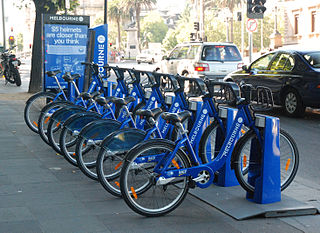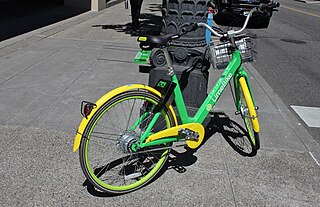
Transport in China has experienced major growth and expansion in recent years. Although China's transport system comprises a vast network of transport nodes across its huge territory, the nodes tend to concentrate in the more economically developed coastal areas and inland cities along major rivers. The physical state and comprehensiveness of China's transport infrastructure tend to vary widely by geography. While remote, rural areas still largely depend on non-mechanized means of transport, a modern maglev system was built in China to connect the city center of Shanghai with Shanghai Pudong International Airport. Airports, roads, and railway construction will provide a massive employment boost in China over the next decade.

A bicycle-sharing system, public bicycle system, or bike-share scheme, is a service in which bicycles are made available for shared use to individuals on a short term basis for a price or free. Many bike share systems allow people to borrow a bike from a "dock" and return it at another dock belonging to the same system. Docks are special bike racks that lock the bike, and only release it by computer control. The user enters payment information, and the computer unlocks a bike. The user returns the bike by placing it in the dock, which locks it in place. Other systems are dockless. For many systems, smartphone mapping apps show nearby available bikes and open docks.
Serotta was an American bicycle builder located in Saratoga Springs, New York. Named after founder Ben Serotta, the company was founded in 1972.
Hangzhou Public Bicycle is a bicycle sharing system serving the city of Hangzhou. As of January 5, 2013, with 66,500 bicycles operating from 2,700 stations, it was the largest bike sharing system in the world, although it has since been overtaken by a number of dockless bike share operators such as Mobike. It is the first bike-sharing system in China. It plans to expand to 175,000 bikes by 2020.
Citi Bike is a privately owned public bicycle sharing system serving the New York City boroughs of Manhattan, Queens, and Brooklyn, as well as Jersey City, New Jersey. Named after lead sponsor Citigroup, it is operated by Motivate, with former Metropolitan Transportation Authority CEO Jay Walder as chief executive. The system's bikes and stations use BIXI-branded technology from PBSC Urban Solutions.

Meituan-Dianping is a Chinese group buying website for locally found food delivery services, consumer products and retail services. The company is headquartered in Beijing and was founded in 2010 by Wang Xing. The Meituan.com site offers deals of the day by selling vouchers on local services and entertainment. As of May 2014, the company has 5,000 employees.

Journey to the West: The Demons Strike Back is a 2017 Chinese fantasy-adventure-comedy film directed by Tsui Hark. A sequel to Stephen Chow's 2013 film Journey to the West: Conquering the Demons, it was produced and co-written by both Tsui and Chow.

Didi Chuxing Technology Co.,, formerly Didi Kuaidi, is a Chinese ride-sharing, artificial intelligence (AI) and autonomous technology conglomerate. It is headquartered in Beijing. It provides services including taxi hailing, private car hailing, social ride-sharing, bike sharing and food delivery to users in China via a smartphone application.

Biketown, also known as Biketown PDX, is a bicycle-sharing system in Portland, Oregon, that began operation on July 19, 2016. The system is owned by Portland Bureau of Transportation (PBOT) and operated by Motivate, with Nike, Inc. as the title sponsor. At launch, the system had 100 stations and 1,000 bicycles serving the city's central and eastside neighborhoods, with hopes to expand outward.
Mobike, also known as Meituanbike, founded by Beijing Mobike Technology Co., Ltd., is a fully station-less bicycle-sharing system headquartered in Beijing, China. It is, by the number of bicycles, the world's largest shared bicycle operator, and in December 2016, made Shanghai the world's largest bike-share city.

ofo is a Beijing-based bicycle sharing company founded in 2014. The dockless system uses its smartphone app to unlock and locate nearby bicycles, charging an hourly rate for use.

LinkBike is a public bicycle sharing system serving the city of George Town in Penang, Malaysia. Launched in 2016, it is the first such system in Malaysia. Currently, there are 250 LinkBike bicycles and 25 stations throughout the city, including its UNESCO World Heritage Site, as well as suburban places like Queensbay Mall.

Bluegogo was a bicycle-sharing system based in Tianjin, China, founded and owned by Tianjin Luding Technology Co., Ltd. It operated in six Chinese cities, and briefly operated in San Francisco, United States in 2017. The station-less bicycle-sharing system used a mobile app to unlock bicycles. The company went bankrupt in November 2017.

oBike is a Singapore registered stationless bicycle-sharing system started by businessmen Shi Yi and Edward Chen with operations in several countries. The bikes have a built-in Bluetooth lock and can therefore be left anywhere at the end of a journey, not just at a docking station. Users use a smartphone app to locate and hire bikes. It launched in Singapore in February 2017, and ceased operation on 25 June 2018 in Singapore. Subsequently, the parent company filed for insolvency in its home market. Before it withdrew from Singapore, it transferred the deposits owed to the Singapore users to its sister company in China. They are currently under investigation for fraud by the Singapore Police Force. The effect on operations outside of Singapore is unknown.

Neutron Holdings, Inc. doing business under the name Lime, formerly LimeBike, is a transportation-rental company based in the United States. It runs bicycle-, scooter-, and car-sharing systems in various cities around the world. The systems offer dockless vehicles which users find and unlock via a mobile app which knows the location of available units via GPS and radio. Lime's charges typically start at $1/1€ for a 30-minute ride on unpowered bicycles, while electric bicycles and scooters cost $1 to unlock and 15 cents per minute in the US.

Spin is a scooter-sharing company that is owned by the Ford Motor Company. It is based in San Francisco and was founded as a start-up in 2017, launching as a dock-less bicycle-sharing system controlled by a mobile app for reservations. Spin later moved into scooter-sharing.

Social Bicycles Inc., doing business as JUMP, is a dockless scooter and electric bicycle sharing system operating in the United States and Germany. The bikes cost US$2 for the first half-hour to rent, then US7¢ per minute. They can be located using the Jump or Uber apps. They are bright red and weigh 70 pounds (32 kg). Each Jump bike has a 250-watt electric motor which powers the front tire. Jump employees swap out the battery packs every three days. At the end of a ride, the bikes have to be locked to a sidewalk bicycle rack. A pilot program began in February 2018, allowing certain users of the Uber app in San Francisco to access Jump's fleet of electric bicycles.
















